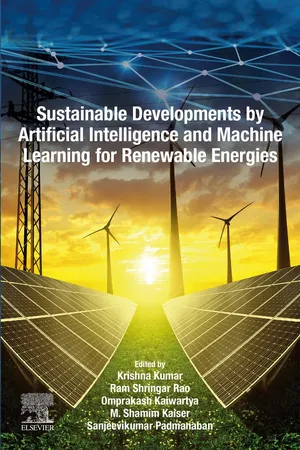
eBook - ePub
Sustainable Developments by Artificial Intelligence and Machine Learning for Renewable Energies
- 416 pages
- English
- ePUB (mobile friendly)
- Available on iOS & Android
eBook - ePub
Sustainable Developments by Artificial Intelligence and Machine Learning for Renewable Energies
About this book
Sustainable Developments by Artificial Intelligence and Machine Learning for Renewable Energies analyzes the changes in this energy generation shift, including issues of grid stability with variability in renewable energy vs. traditional baseload energy generation. Providing solutions to current critical environmental, economic and social issues, this book comprises various complex nonlinear interactions among different parameters to drive the integration of renewable energy into the grid. It considers how artificial intelligence and machine learning techniques are being developed to produce more reliable energy generation to optimize system performance and provide sustainable development.
As the use of artificial intelligence to revolutionize the energy market and harness the potential of renewable energy is essential, this reference provides practical guidance on the application of renewable energy with AI, along with machine learning techniques and capabilities in design, modeling and for forecasting performance predictions for the optimization of renewable energy systems. It is targeted at researchers, academicians and industry professionals working in the field of renewable energy, AI, machine learning, grid Stability and energy generation.
- Covers the best-performing methods and approaches for designing renewable energy systems with AI integration in a real-time environment
- Gives advanced techniques for monitoring current technologies and how to efficiently utilize the energy grid spectrum
- Addresses the advanced field of renewable generation, from research, impact and idea development of new applications
Tools to learn more effectively

Saving Books

Keyword Search

Annotating Text

Listen to it instead
Information
Table of contents
- Sustainable Developments by Artificial Intelligence and Machine Learning for Renewable Energies
- Chapter 1 Application of alternative clean energy
- Chapter 2 Optimization of hybrid energy generation
- Chapter 3 IoET-SG: Integrating internet of energy things with smart grid
- Chapter 4 Evolution of high efficiency passivated emitter and rear contact (PERC) solar cells
- Chapter 5 Online-based approach for frequency control of microgrid using biologically inspired intelligent controller
- Chapter 6 Optimal allocation of renewable energy sources in electrical distribution systems based on technical and economic indices
- Chapter 7 Optimization of renewable energy sources using emerging computational techniques
- Chapter 8 Advanced renewable dispatch with machine learning-based hybrid demand-side controller: The state of the art and a novel approach
- Chapter 9 A machine learning-based design approach on PCMs-PV systems with multilevel scenario uncertainty
- Chapter 10 Agent-based peer-to-peer energy trading between prosumers and consumers with cost-benefit business models
- Chapter 11 Machine learning-based hybrid demand-side controller for renewable energy management
- Chapter 12 Prediction of energy generation target of hydropower plants using artificial neural networks
- Chapter 13 Response surface methodology-based optimization of parameters for biodiesel production
- Chapter 14 Reservoir simulation model for the design of irrigation projects
- Chapter 15 Effect of hydrofoils on the starting torque characteristics of the Darrieus hydrokinetic turbine
- Index
Frequently asked questions
Yes, you can cancel anytime from the Subscription tab in your account settings on the Perlego website. Your subscription will stay active until the end of your current billing period. Learn how to cancel your subscription
No, books cannot be downloaded as external files, such as PDFs, for use outside of Perlego. However, you can download books within the Perlego app for offline reading on mobile or tablet. Learn how to download books offline
Perlego offers two plans: Essential and Complete
- Essential is ideal for learners and professionals who enjoy exploring a wide range of subjects. Access the Essential Library with 800,000+ trusted titles and best-sellers across business, personal growth, and the humanities. Includes unlimited reading time and Standard Read Aloud voice.
- Complete: Perfect for advanced learners and researchers needing full, unrestricted access. Unlock 1.4M+ books across hundreds of subjects, including academic and specialized titles. The Complete Plan also includes advanced features like Premium Read Aloud and Research Assistant.
We are an online textbook subscription service, where you can get access to an entire online library for less than the price of a single book per month. With over 1 million books across 990+ topics, we’ve got you covered! Learn about our mission
Look out for the read-aloud symbol on your next book to see if you can listen to it. The read-aloud tool reads text aloud for you, highlighting the text as it is being read. You can pause it, speed it up and slow it down. Learn more about Read Aloud
Yes! You can use the Perlego app on both iOS and Android devices to read anytime, anywhere — even offline. Perfect for commutes or when you’re on the go.
Please note we cannot support devices running on iOS 13 and Android 7 or earlier. Learn more about using the app
Please note we cannot support devices running on iOS 13 and Android 7 or earlier. Learn more about using the app
Yes, you can access Sustainable Developments by Artificial Intelligence and Machine Learning for Renewable Energies by Krishna Kumar,Ram Shringar Rao,Omprakash Kaiwartya,Shamim Kaiser,Sanjeevikumar Padmanaban in PDF and/or ePUB format, as well as other popular books in Technology & Engineering & Energy. We have over one million books available in our catalogue for you to explore.